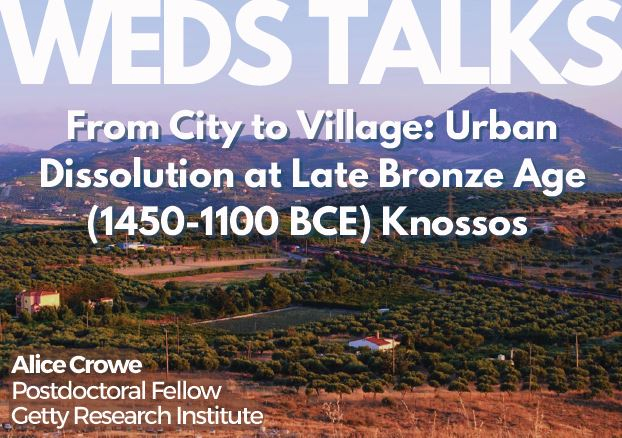Past Events
Interested in Cotsen events? Sign up for our mailing list.The Andean Working Group presents "Abundant Waters: An Archaeology of El Niño and the Desert Farmers of Coastal Peru" by Ari Caramanica, Assistant Professor in the Department of Anthropology at Vanderbilt University.
Registration is required for in-person and virtual participation. Register at http://tinyurl.com/AWGCaramanica
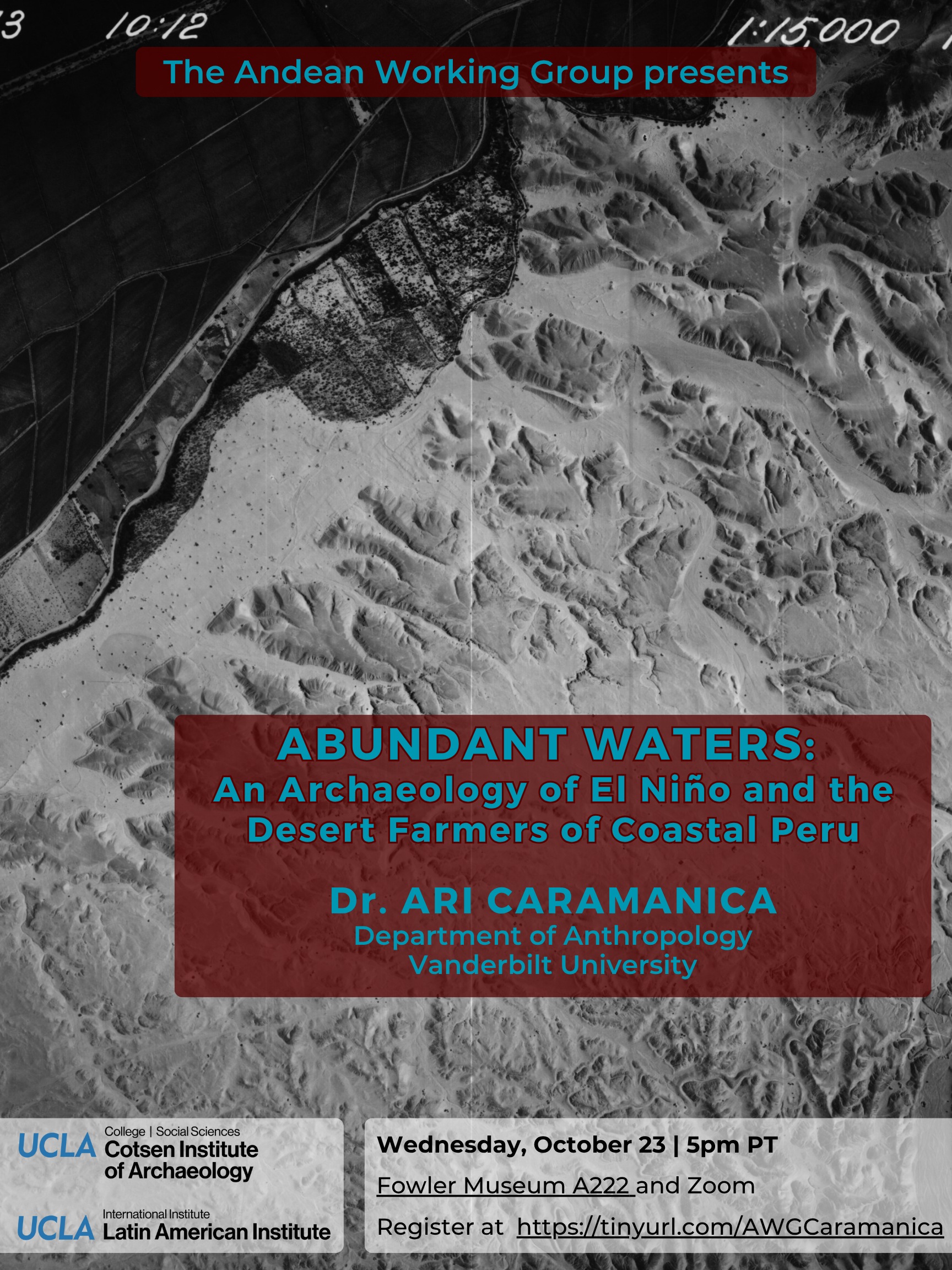
This event is co-sponsored by the UCLA Latin American Institute and the Cotsen Institute of Archaeology.
Contact Gabriel Silva Collins
Email gsilvacollins@g.ucla.edu
Phone
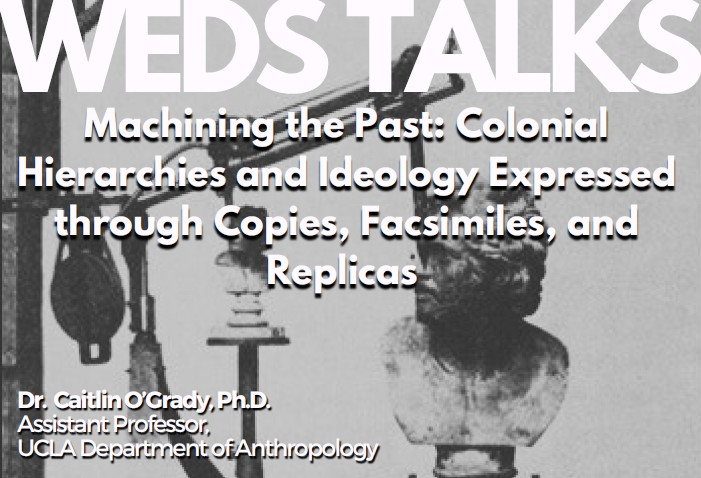
ABSTRACT: Plaster reproductions of Classical and Mesoamerican archaeological materials displayed at World’s Fairs or universal exhibitions and their connections to colonial perceptions of imperialism and empire.
BIO: Dr. Caitlin R. O’Grady is a trained conservator and conservation scientist specializing in analysis and preservation of archaeological materials. She is currently Assistant Professor in the University of California, Los Angeles (UCLA) Department of Anthropology and UCLA/Getty Program in the Conservation of Cultural Heritage. In this capacity, she teaches and advises undergraduate and graduate students in Anthropology and Conservation, as well as conducts research in the history of conservation and archaeology disciplines. Previously, she held a faculty position at the University College London’s Institute of Archaeology where she taught in the postgraduate conservation programs and managed the FTIR and Raman instrumentation in the Institute’s Wolfson Archaeological Science Laboratories.
Caitlin’s research interests include the disciplinary histories of conservation/conservation science and their intersection with that of archaeology, as well as the preservation and scientific analysis of ceramics, historic conservation materials, lime-plaster wall paintings, and mudbrick.
Contact Sumiji Takahashi
Email sutakahashi@ioa.ucla.edu
Phone 310-825-4169
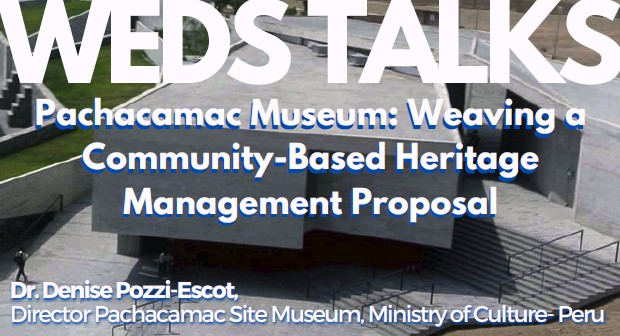
ABSTRACT: The Pachacamac Museum is located within the archaeological sanctuary of the same name, south of Lima and near the Pacific coast, in an area now integrated into the urban fabric of the capital. This sanctuary was one of the most important ceremonial centers of pre-Hispanic Peru and represents a heritage space of immense historical, cultural, and symbolic significance.
In a context shaped by cultural diversity and the presence of neighboring communities of varied origins, the museum understands heritage as a common bond that strengthens collective identity and fosters social integration. Guided by the principles of social museology, the institution prioritizes educational initiatives and affective strategies that place the community as a central partner in processes of research, conservation, and dissemination.
Through this approach, the Pachacamac Museum aspires to consolidate its role not only as custodian of a site of universal value but also as a dynamic space for dialogue, inclusion, and the collective construction of memory. In doing so, it contributes to a broader reflection on the social responsibilities of museums in contemporary Peru.
BIO: Denise Pozzi-Escot studied archaeology at the Universidad Nacional Mayor de San Marcos in Lima, Peru, and received a postgraduate degree at Paris 1 Panthéon-Sorbonne. She excavated at the Conchopata site in Ayacucho, Peru, and in Chincha. She also excavated on Corsica and at Pincevent in Paris. She is a board member for ICOM Perú. and a visiting professor in the master’s programs on South American archaeology at the Universidad Nacional de Trujillo (Peru) and Université de Rennes 1 (France). She is responsible for several community education and outreach projects, including one that empowers local women to become entrepreneurs and use Pachacamac iconography in their products.
Contact Sumiji Takahashi
Email sutakahashi@ioa.ucla.edu
Phone 310-825-4169
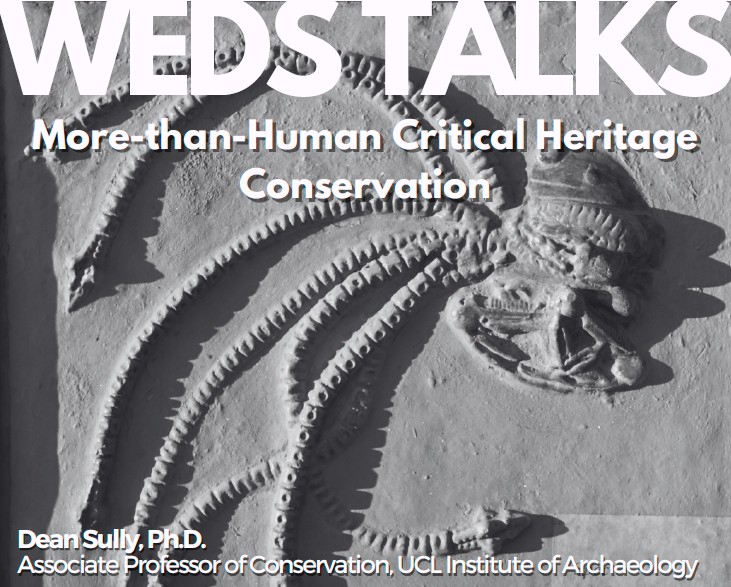
ABSTACT: This talk will present two speculative archaeological conservation projects currently underway at the Getty: Conservation Object as a Matter of Concern: “ ‘Ayn Ghazal in a Future World”, and ‘Museum Objects in This Future World’. The relevance of these playful projects will be discussed in relation to a current book project 'Beyond Just-Human: Critical Approaches to Heritage Conservation Practice'.
BIO: Dean's current research aims to re-situate heritage practice, from maintaining the metastable authenticity of heritage places and objects towards co-curating ecosociologically-constituted multispecies worlds. It looks to move beyond concepts that continue to privilege human agencies that sustain inequalities, towards a pluriversity of affective ecosociological potentialities of (post)human and nonhuman matter. This is addressed via transarticulating sympoietic framing that brings creative practice and heritage processes into flux through experimental science-art worldings. This enables a heritage conservation that addresses the social issues of the present in making more-liveable more-than-human worlds by making common cause with other human, non-human, and non-living actors.
Contact Sumiji Takahashi
Email sutakahashi@ioa.ucla.edu
Phone 310-825-4169
The Andean Working Group presents "Kubler in Cuzco: Shaping Architectural Modernity After the 1950 Earthquake" by Dr. Lucia Allais, Associate Professor in the Columbia University Graduate School of Architecture, Planning, and Preservation.
Registration is required for in-person and virtual participation. Register at tinyurl.com/AWGAllais
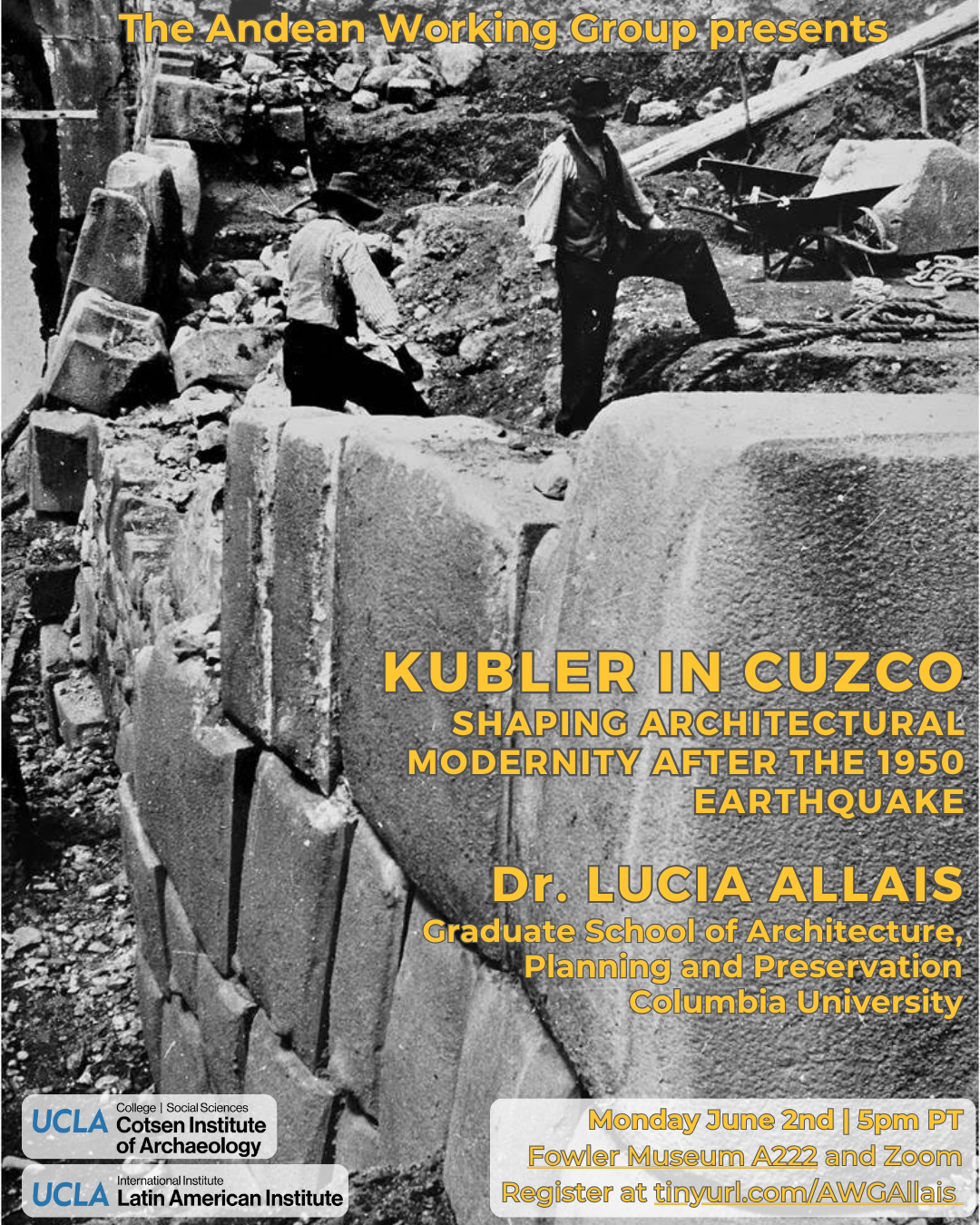
This event is co-sponsored by the UCLA Latin American Institute and the Cotsen Institute of Archaeology.
Download the flyer here.
Contact Alba Menéndez Pereda
Email albamenendez@ucla.edu
Phone
Spring 2025 Waystation Workshop
Dr. Emiliano Ricardo Melgar Tisoc
Researcher, Templo Mayor Museum, Instituto National de Antropología y Historia (INAH)
Using approximately 40 lithic artifacts recently accepted into the Waystation’s voluntary return program, Emiliano Melgar will demonstrate analytic methods through a first traceological examination to determine their ancient Mexican cultural affiliation and technological styles. He will discuss different techniques of identifying raw materials and manufacturing traces, what information can be obtained from them, the accuracy and limitations of these techniques, and the importance of reference assemblages for comparative purposes.
Register for the workshop here
 Dr Melgar earned a BA in Archaeology from the National School of Anthropology and History (ENAH) in Mexico and an MA and Ph.D. in Anthropology from National Autonomous University of Mexico (UNAM). Since 2004 he has been a full-time researcher at the Templo Mayor Museum. Dr Melgar’research has been awarded the 2010 Alfonso Caso Award for best bachelor thesis in archaeology, the 2011 Teotihuacan Award for best essay on the materials of that city, and the 2019 Award of the Mexican Academy of Sciences for the best young researcher in the Mexican Humanities. He has written five books and more than 80 articles for domestic and foreign publications. His new book, “Lapidary Objects from the Great Temple: Styles and Technological Traditions”, received the Honorable Mention in the 2024 INAH Prize for the best archaeological research in Mexico.
Dr Melgar earned a BA in Archaeology from the National School of Anthropology and History (ENAH) in Mexico and an MA and Ph.D. in Anthropology from National Autonomous University of Mexico (UNAM). Since 2004 he has been a full-time researcher at the Templo Mayor Museum. Dr Melgar’research has been awarded the 2010 Alfonso Caso Award for best bachelor thesis in archaeology, the 2011 Teotihuacan Award for best essay on the materials of that city, and the 2019 Award of the Mexican Academy of Sciences for the best young researcher in the Mexican Humanities. He has written five books and more than 80 articles for domestic and foreign publications. His new book, “Lapidary Objects from the Great Temple: Styles and Technological Traditions”, received the Honorable Mention in the 2024 INAH Prize for the best archaeological research in Mexico.
Contact Lyssa Stapleton
Email waystation@ioa.ucla.edu
Phone
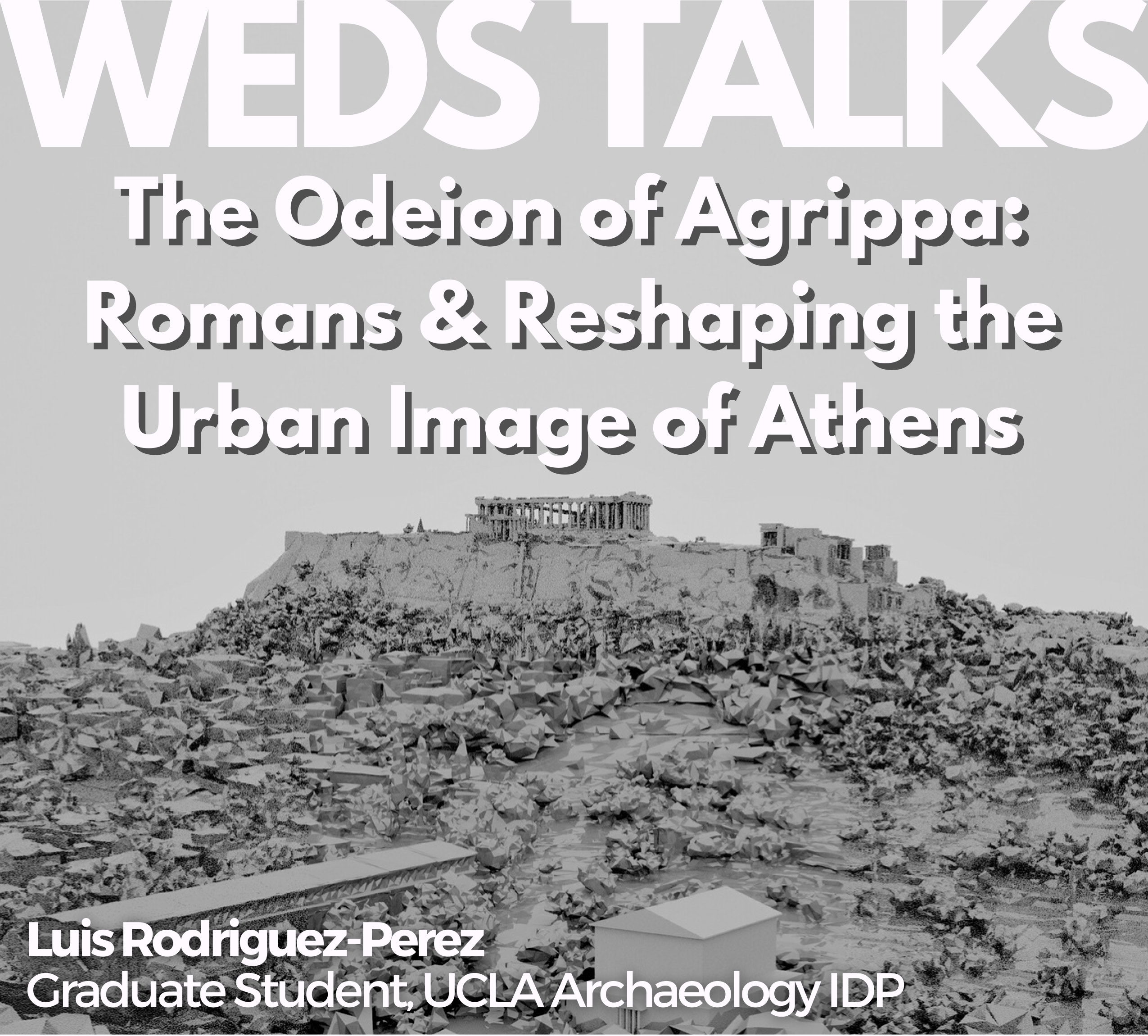
ABSTRACT: The Odeion of Agrippa was among the first major Roman constructions in the city of Athens after years of spoliation. Despite an assemblage of "similar" buildings that the Romans constructed in the city, the Odeion of Agrippa stands out both spatially and architecturally. In 2024, I carried photogrammetric captures of the site to reconstruct how the building fit in the local topography and how it engaged in the surrounding architectural programming of the city. I argue that not only did Romans utilize architectural ornamentation to steer the city in a new direction, but they created a new space that enmeshed their own history with Athens' heroic past.
BIO: Luis Rodriguez-Perez is a 3rd year Ph.D. student at the Cotsen Institute of Archaeology at UCLA. His research focuses on identity and architecture in early Roman Athens, applying 3D and other visualization methods.
Contact Sumiji Takahashi
Email sutakahashi@ioa.ucla.edu
Phone 310-825-4169
The UCLA Department of Classics and the Cotsen Institute of Archaeology present a lecture by Rebecca R. Benefiel, Abigail Grigsby Urquhart Professor of Classics at Washington and Lee University on The Nature of Ancient Graffiti: Exploring Popular Writing in Pompeii.
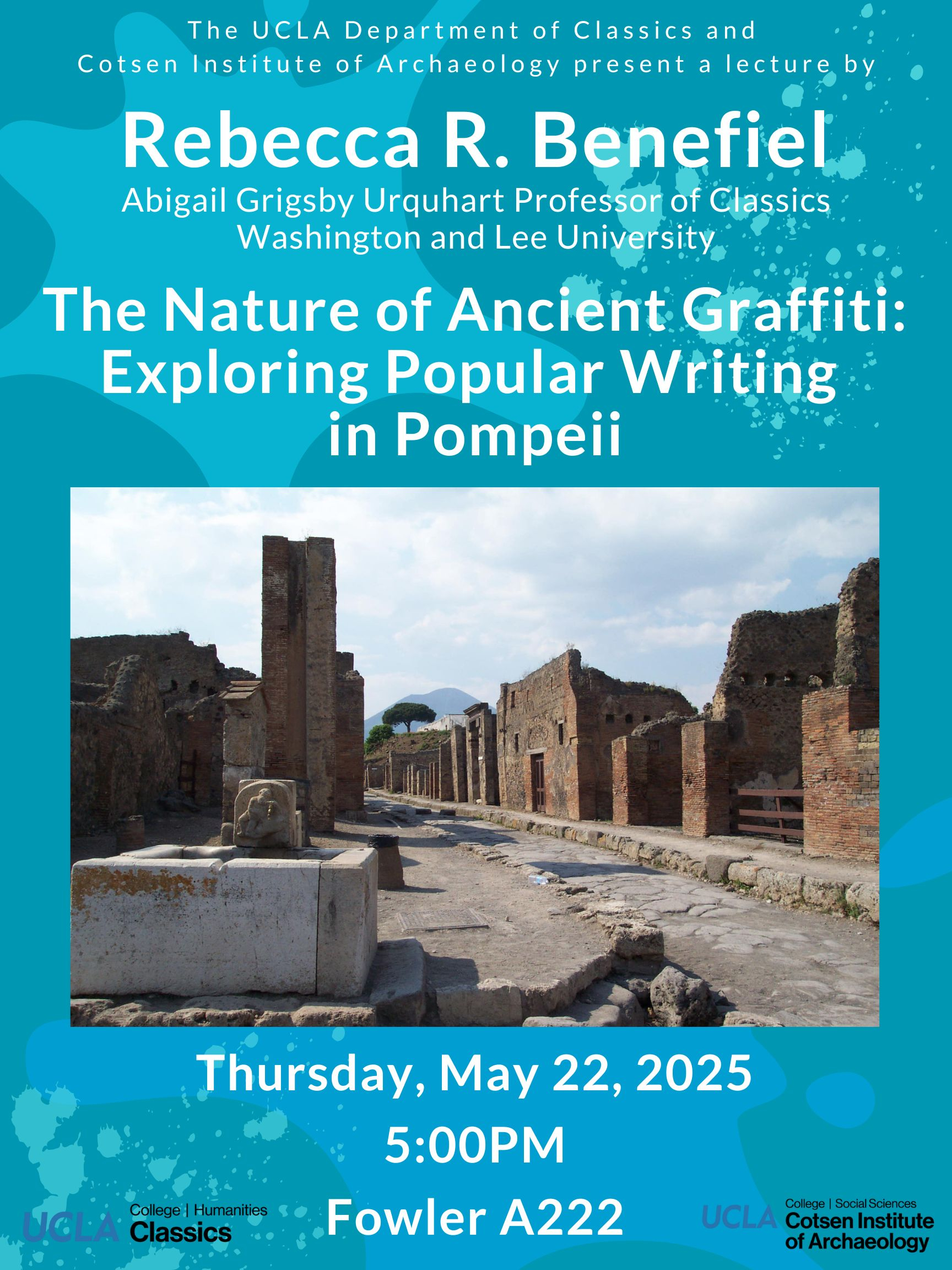
Contact
Phone
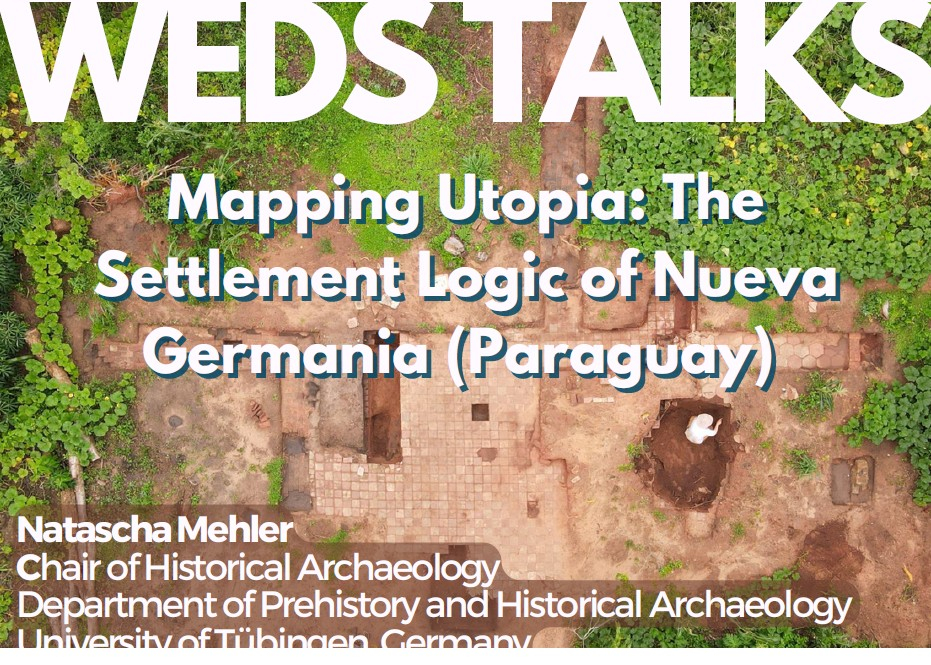
ABSTRACT: This talk will investigate processes of urban dissolution, a phenomenon herein defined as the loss of the urban scale. In contrast to the robust body of archaeological literature on urban formation and urban maintenance, comparatively few analyses have targeted urban decline, particularly in an Aegean context, where the disappearance of urbanism has been presumed the byproduct of the collapse of the state. Positioned in opposition to these narratives, the talk examines the urban dissolution of Late Bronze Age Knossos. From the mid-18th to mid-15th centuries BCE, Knossos was the largest city in the Aegean, twice the size of the region’s other settlements. About 350 years later, it had lost three quarters of its urban fabric and dwindled to the size of a village. The talk analyzes how and why the loss of urbanism occurred, through study of material evidence recovered by over a century of archaeological exploration in the Knossos valley.
BIO: Alice Crowe is a Postdoctoral Fellow at the Getty Research Institute. She received her Ph.D. and M.A. from the University of Cincinnati and a B.A. from Boston University. Her research focuses on the archaeology of the Late Bronze Age Aegean, and centers especially on the site of Knossos, where she explores issues of memory, urbanism and its loss, and ceramic production and consumption. For this research, she has received support from the American School of Classical Studies at Athens, the Archaeological Institute of America, and the University of Cincinnati University Research Council. Beyond ongoing projects at Knossos, she is publishing Late Bronze Age ceramic assemblages collected from the sites of Galatas and Tell Atchana, and by a regional survey of the Brauron area (ARTEMIS).
Contact Sumiji Takahashi
Email sutakahashi@ioa.ucla.edu
Phone 310-825-4169
ABSTRACT: This talk will investigate processes of urban dissolution, a phenomenon herein defined as the loss of the urban scale. In contrast to the robust body of archaeological literature on urban formation and urban maintenance, comparatively few analyses have targeted urban decline, particularly in an Aegean context, where the disappearance of urbanism has been presumed the byproduct of the collapse of the state. Positioned in opposition to these narratives, the talk examines the urban dissolution of Late Bronze Age Knossos. From the mid-18th to mid-15th centuries BCE, Knossos was the largest city in the Aegean, twice the size of the region’s other settlements. About 350 years later, it had lost three quarters of its urban fabric and dwindled to the size of a village. The talk analyzes how and why the loss of urbanism occurred, through study of material evidence recovered by over a century of archaeological exploration in the Knossos valley.
BIO: Alice Crowe is a Postdoctoral Fellow at the Getty Research Institute. She received her Ph.D. and M.A. from the University of Cincinnati and a B.A. from Boston University. Her research focuses on the archaeology of the Late Bronze Age Aegean, and centers especially on the site of Knossos, where she explores issues of memory, urbanism and its loss, and ceramic production and consumption. For this research, she has received support from the American School of Classical Studies at Athens, the Archaeological Institute of America, and the University of Cincinnati University Research Council. Beyond ongoing projects at Knossos, she is publishing Late Bronze Age ceramic assemblages collected from the sites of Galatas and Tell Atchana, and by a regional survey of the Brauron area (ARTEMIS).
Contact Sumiji Takahashi
Email sutakahashi@ioa.ucla.edu
Phone 310-825-4169
- ‹ previous
- 2 of 50
- next ›




